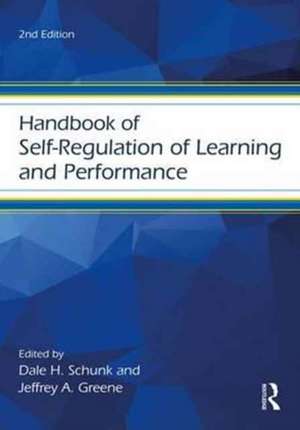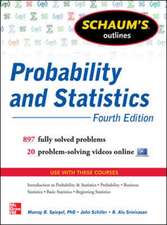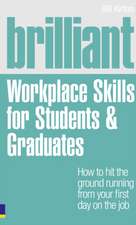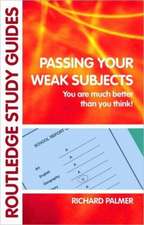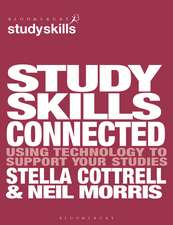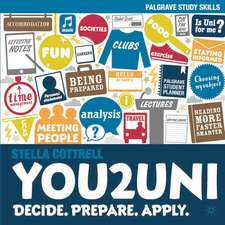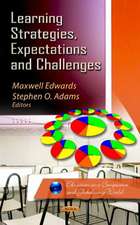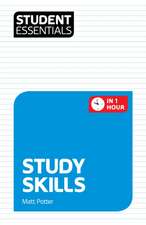Handbook of Self-Regulation of Learning and Performance: Educational Psychology Handbook
Editat de Dale H. Schunk, Jeffrey A. Greeneen Limba Engleză Paperback – 19 sep 2017
Chapter Structure– To ensure uniformity and coherence across chapters, each chapter author addresses the theoretical ideas underlying their topic, research evidence bearing on these ideas, future research directions, and implications for educational practice.
Global– A significant number of international contributors are included to reflect the increasingly international research on self-regulation.
Readable– In order to make the book accessible to students, chapters have been carefully edited for clarity, conciseness, and organizational consistency.
Expertise– All chapters are written by leading researchers who are highly regarded experts on their particular topics and are active contributors to the field.
| Toate formatele și edițiile | Preț | Express |
|---|---|---|
| Paperback (1) | 768.08 lei 3-5 săpt. | +37.31 lei 6-10 zile |
| Taylor & Francis – 19 sep 2017 | 768.08 lei 3-5 săpt. | +37.31 lei 6-10 zile |
| Hardback (1) | 1528.09 lei 6-8 săpt. | |
| Taylor & Francis – 7 sep 2017 | 1528.09 lei 6-8 săpt. |
Din seria Educational Psychology Handbook
- 9%
 Preț: 804.33 lei
Preț: 804.33 lei - 9%
 Preț: 804.77 lei
Preț: 804.77 lei - 5%
 Preț: 731.20 lei
Preț: 731.20 lei - 25%
 Preț: 666.31 lei
Preț: 666.31 lei - 18%
 Preț: 806.90 lei
Preț: 806.90 lei - 9%
 Preț: 1798.95 lei
Preț: 1798.95 lei - 18%
 Preț: 856.66 lei
Preț: 856.66 lei - 25%
 Preț: 689.67 lei
Preț: 689.67 lei - 18%
 Preț: 859.58 lei
Preț: 859.58 lei - 18%
 Preț: 851.93 lei
Preț: 851.93 lei - 18%
 Preț: 849.52 lei
Preț: 849.52 lei - 18%
 Preț: 965.19 lei
Preț: 965.19 lei - 18%
 Preț: 857.42 lei
Preț: 857.42 lei - 18%
 Preț: 794.30 lei
Preț: 794.30 lei - 25%
 Preț: 607.05 lei
Preț: 607.05 lei - 18%
 Preț: 739.82 lei
Preț: 739.82 lei - 18%
 Preț: 811.49 lei
Preț: 811.49 lei - 18%
 Preț: 749.45 lei
Preț: 749.45 lei - 18%
 Preț: 791.60 lei
Preț: 791.60 lei - 18%
 Preț: 962.37 lei
Preț: 962.37 lei - 18%
 Preț: 745.04 lei
Preț: 745.04 lei
Preț: 768.08 lei
Preț vechi: 844.04 lei
-9% Nou
Puncte Express: 1152
Preț estimativ în valută:
146.97€ • 160.15$ • 123.85£
146.97€ • 160.15$ • 123.85£
Carte disponibilă
Livrare economică 02-16 aprilie
Livrare express 18-22 martie pentru 47.30 lei
Preluare comenzi: 021 569.72.76
Specificații
ISBN-13: 9781138903197
ISBN-10: 1138903191
Pagini: 530
Ilustrații: 24
Dimensiuni: 178 x 254 x 34 mm
Greutate: 0.93 kg
Ediția:Revised
Editura: Taylor & Francis
Colecția Routledge
Seria Educational Psychology Handbook
Locul publicării:Oxford, United Kingdom
ISBN-10: 1138903191
Pagini: 530
Ilustrații: 24
Dimensiuni: 178 x 254 x 34 mm
Greutate: 0.93 kg
Ediția:Revised
Editura: Taylor & Francis
Colecția Routledge
Seria Educational Psychology Handbook
Locul publicării:Oxford, United Kingdom
Public țintă
Postgraduate and ProfessionalCuprins
Contents
Section V. Individual and Group Differences in Self-Regulation of Learning and Performance
26. Calibration of Performance and Academic Delay of Gratification: Individual and Group Differences in Self-Regulation of Learning
Peggy P. Chen and Héfer Bembenutty
27. Academic Help Seeking as a Self-Regulated Learning Strategy: Current Issues, Future Directions
Stuart A. Karabenick and Eleftheria N. Gonida
28. The Three Faces of Epistemic Thinking in Self-Regulated Learning
Krista R. Muis and Cara Singh
29. Advances in Understanding Young Children’s Self-Regulation of Learning
Nancy E. Perry, Lynda R. Hutchinson, Nikki Yee, and Elina Määttä
30. Self-Regulation: Implications for Individuals With Special Needs
Linda H. Mason and Robert Reid
31. Culture and Self-Regulation in Educational Contexts
Dennis M. McInerney and Ronnel B. King
- Historical, Contemporary, and Future Perspectives on Self-Regulated Learning and PerformanceDale H. Schunk and Jeffrey A. Greene
Section I. Basic Domains of Self-Regulation of Learning and Performance - Social Cognitive Theoretical Perspective of Self-RegulationEllen L. Usher and Dale H. Schunk
- Cognition and Metacognition Within Self-Regulated LearningPhilip H. Winne
- Developmental Trajectories of Skills and Abilities Relevant for Self-Regulation ofLearning and Performance
Rick H. Hoyle and Amy L. Dent - Motivation and Affect in Self-Regulated Learning: Does Metacognition Play a Role?Anastasia Efklides, Bennett L. Schwartz, and Victoria Brown
- Self-Regulation, Co-Regulation and Shared Regulation in Collaborative Learning EnvironmentsAllyson Hadwin, Sanna Järvelä, and Mariel Miller
Section II. Self-Regulation of Learning and Performance in Context - Metacognitive Pedagogies in Mathematics Classrooms: From Kindergarten to College and BeyondZemira R. Mevarech, Lieven Verschaffel, and Erik De Corte
- Self-Regulated Learning in ReadingKeith W. Thiede and Anique B. H. de Bruin
- Self-Regulation and WritingSteve Graham, Karen R. Harris, Charles MacArthur, and Tanya Santangelo
- The Self-Regulation of Learning and Conceptual Change in Science: Research,Theory, and Educational Applications
Gale M. Sinatra and Gita Taasoobshirazi - Using Technology-Rich Environments to Foster Self-Regulated Learning in the Social StudiesEric G. Poitras and Susanne P. Lajoie
- Self-Regulated Learning in Music Practice and PerformanceGary E. McPherson, Peter Miksza, and Paul Evans
- Self-Regulation in Athletes: A Social Cognitive PerspectiveAnastasia Kitsantas, Maria Kavussanu, Deborah B. Corbatto, and Pepijn K. C. van de Pol
- Self-Regulation: An Integral Part of Standards-Based EducationMarie C. White and Maria K. DiBenedetto
- Teachers as Agents in Promoting Students’ SRL and Performance: Applicationsfor Teachers’ Dual-Role Training Program
Bracha Kramarski
Section III. Technology and Self-Regulation of Learning and Performance - Emerging Classroom Technology: Using Self-Regulation Principles as a Guide for Effective ImplementationDaniel C. Moos
- Understanding and Reasoning About Real-Time Cognitive, Affective, andMetacognitive Processes to Foster Self-Regulation With Advanced Learning Technologies
Roger Azevedo, Michelle Taub, and Nicholas V. Mudrick - The Role of Self-Regulated Learning in Digital GamesJohn L. Nietfeld
- Self-Regulation of Learning and Performance in Computer-Supported Collaborative Learning EnvironmentsPeter Reimann and Maria Bannert
Section IV. Methodology and Assessment of Self-Regulation of Learning and Performance - Validity and the Use of Self-Report Questionnaires to Assess Self-Regulated LearningChristopher A. Wolters and Sungjun Won
- Capturing and Modeling Self-Regulated Learning Using Think-Aloud ProtocolsJeffrey A. Greene, Victor M. Deekens, Dana Z. Copeland, and Seung Yu
- Assessing Self-Regulated Learning Using Microanalytic MethodsTimothy J. Cleary and Gregory L. Callan
- Advancing Research and Practice About Self-Regulated Learning: The Promise of In-Depth Case Study MethodologiesDeborah L. Butler and Sylvie C. Cartier
- Examining the Cyclical, Loosely Sequenced, and Contingent Features of Self-Regulated Learning: Trace Data and Their AnalysisMatthew L. Bernacki
- Data Mining Methods for Assessing Self-Regulated Learning
Section V. Individual and Group Differences in Self-Regulation of Learning and Performance
26. Calibration of Performance and Academic Delay of Gratification: Individual and Group Differences in Self-Regulation of Learning
Peggy P. Chen and Héfer Bembenutty
27. Academic Help Seeking as a Self-Regulated Learning Strategy: Current Issues, Future Directions
Stuart A. Karabenick and Eleftheria N. Gonida
28. The Three Faces of Epistemic Thinking in Self-Regulated Learning
Krista R. Muis and Cara Singh
29. Advances in Understanding Young Children’s Self-Regulation of Learning
Nancy E. Perry, Lynda R. Hutchinson, Nikki Yee, and Elina Määttä
30. Self-Regulation: Implications for Individuals With Special Needs
Linda H. Mason and Robert Reid
31. Culture and Self-Regulation in Educational Contexts
Dennis M. McInerney and Ronnel B. King
Notă biografică
Dale H. Schunk is Professor in the Department of Teacher Education and Higher Education in the School of Education at the University of North Carolina at Greensboro, USA.
Jeffrey A. Greene is Associate Professor in the Learning Sciences and Psychological Studies program in the School of Education at the University of North Carolina at Chapel Hill, USA.
Jeffrey A. Greene is Associate Professor in the Learning Sciences and Psychological Studies program in the School of Education at the University of North Carolina at Chapel Hill, USA.
Recenzii
"This volume accomplishes its goal of integrating various aspects of self-regulated learning and performance into one book. The content helpfully presents the numerous ways in which SRL can be considered, including its processes as well as its applications within and outside the classroom, in content areas, in terms of assessment, and in considering individual differences. The book will be beneficial for students and professionals in various fields, and editors Schunk and Greene—two very well-respected educational psychology scholars—bring credibility to this important topic."
—Anastasia Kitsantas, Professor of Educational Psychology in the College of Education and Human Development at George Mason University, USA
"This handbook is an excellent resource for beginning and seasoned researchers studying self-regulated learning. Its major strengths include a section on the self-regulation of learning in different content areas as well as group and cultural differences in how learners approach self-regulation. The volume is well-grounded in relevant theory and empirical research."
—Pavlo Antonenko, Associate Professor of Educational Technology and Director of the NeurAL Lab in the School of Teaching and Learning at the University of Florida, USA
—Anastasia Kitsantas, Professor of Educational Psychology in the College of Education and Human Development at George Mason University, USA
"This handbook is an excellent resource for beginning and seasoned researchers studying self-regulated learning. Its major strengths include a section on the self-regulation of learning in different content areas as well as group and cultural differences in how learners approach self-regulation. The volume is well-grounded in relevant theory and empirical research."
—Pavlo Antonenko, Associate Professor of Educational Technology and Director of the NeurAL Lab in the School of Teaching and Learning at the University of Florida, USA
Descriere
This second edition of the popular Handbook of Self-Regulation of Learning and Performance responds to and incorporates the wealth of new research that the first edition inspired on the subject.
